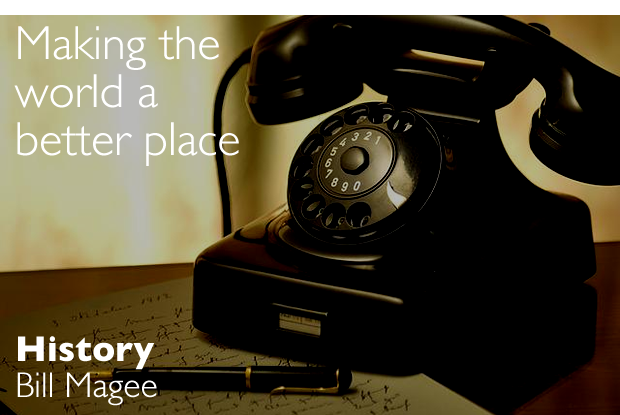
Scotland and with it Scots must not forget how, as western Europe’s poorest nation, it created our modern world and everything in it. This is the view of historian Arthur L Herman, senior fellow at the Hudson Institute think tank and research centre, based in Washington DC. We achieved the age old balancing act of combining a respect for science and technology with a love for the arts.
It’s amazing what you come across when rummaging through a box in that corner of boxes most of us have in our homes. In this case, a book I was kindly given by the former British Consulate General, a Scot John Rankin. The find is timely. According to reports, two papers will appear before the Scottish Parliament before its recess on 20 June, prepared by civil servants and understood to set out the vision for an independent Scotland. A two-page document was released earlier this month showing how ministers have been advised they have a legal basis to test the independence question with the Electoral Commission, a move opposed by the UK Government.
Along with writing books about Joseph McCarthy, Gandhi and Churchill, Herman singles out Scotland. In his The Scottish Enlightenment: The Scots’ Invention of the Modern World, he states that Scotland should not forget the ‘crucial part’ it has played.
During Herman’s academic spell, including a BA from University of Minnesota and MA and PhD in history from John Hopkins University, he spent a semester at University of Edinburgh. It was here that the keen young academic and writer of what became a New York Times bestseller realised how, in essence, Scotland’s turbulent history, from William Wallace to the Presbyterian Lords of the Covenant, laid the foundations for the ‘Scottish miracle’.
This is no glowing account but a no-holds-barred appraisal. The process, for all its ‘faults and failures, blind spots and injustices’, is well worth scrutinising, he claims. Especially now as Scotland moves forward towards its new and uncertain future, where it should not forget its achievement; any more than it should forget its earlier, pre-modern past.
In particular, Herman states: ‘As the first modern nation and culture, the Scots have by and large made the world a better place. They taught the world that true liberty requires a sense of personal obligation as well as individual rights. They showed how modern life can be spiritually as well as materially fulfilling. They showed how a respect for science and technology can comine with a love for the arts how private affluence can enhance a sense of civic responsibility; how political and economic democracy can flourish side by side; and how a confidence in the future depends on a reverence for the past’.
He added: ‘The Scottish mind grasped how, in Hume’s words: liberty is the perfection of civil society but authority must be acknowledged essential to its very existance. How a strong faith in progress also requires a keen appreciation of its limitations’.
The book does, however, carry with it a warning of what Herman describes as ‘suffering from a profusion of very general surveys, a multitude of specialised surveys and monographs, and not enough good books in between’. He warns of historians who write for a general audience tending to be drawn in to the more romantic episodes in Scottish history.
He highlights how, in recent decades, a trio of scholars have set out to correct this problem. First, Thomas Devine’s The Scottish Nation: A History 1700-2000, is an invaluable guide to the economic and social history of modern Scotland, along with some of his other writings. Second, Professor Bruce Lenman at St Andrews University, with books such as The Jacobite Risings in Britain, 1689-1746. And third, John Prebble’s trio covering the defeat of Highland Scotland, in which ‘he spent a lifetime trying to uncover the forgotten tragic episodes of modern Scottish history and make them come alive for the modern reader’.
Above all, what Arthur Herman achieves is a comprehensive appraisal. Scotland did indeed have a disproportionate influence on the planet. Other examples? Ancient Athens, Medieval China and Renassance Italy.
He covers this by stressing at the outset that the Scots did not do everything by themselves: other nations including Germany, France, Italy, Russia and England have their place in the making of the modern world. It’s just, the Scots more than anyone else who ‘created the lens’ through which we see the final product. When we gaze out on a contemporary world shaped by technology, capitalism and modern democracy, struggling to find our place as individuals in it, we are in effect viewing the world as the Scots did.
The Scottish Enlightment is inseperable from its legacy. The age of Adam Smith, David Hume, James Watt, Robert Adam and Robert Burns; when Glasgow, Aberdeen and Edinburgh were the ‘triple wellsprings of the modern mind’, is not just an episode in Scottish history. It also marks a crucial point in America, development of the British Empire and Europe, not to mention the United Kingdom.
Summing up, I do like the comment made, when, during a school exchange in Nebraska, a Scot was asked if we had television in Scotland. The reply: ‘We invented it’.
Former Reuters, Sunday Times, The Scotsman and Glasgow Herald business and finance correspondent, Bill Magee is a columnist writing tech-based articles for Daily Business, Institute of Directors, Edinburgh Chamber and occasionally The Times’ ‘Thunderer’